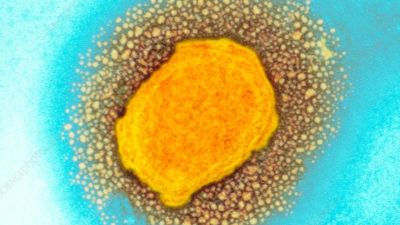Monkeypox could have ‘massive impact’ on sexual health services, doctor warns

Monkeypox is much harder to catch than Covid as close contact is needed, meaning it is not considered a threat to most people. But some sexual health centres have already reduced services to lower the risk of their staff having to isolate, reports Amy Lewis
Monkeypox could have a “massive impact” on access to sexual health services, a top doctor has warned, as some clinics halt walk-in services.
The disease, which was first found in monkeys, can be transmitted from person to person through close physical contact – including sexual intercourse – and is caused by the monkeypox virus.
The number of cases confirmed in Britain has hit 20 with nine other countries outside of Central and West Africa also reporting outbreaks.
Dr Claire Dewsnap, president of the British Association for Sexual Health and HIV, said she is concerned about how the infection could affect services because staff who come in contact with sufferers are forced to isolate.
She told the BBC that clinic staff were “already under significant pressure” before monkeypox was identified, making the situation worse.
“It is already stretching the workforce and will have a massive impact if staff have to isolate if they are in close contact with someone who’s infected,” Dr Dewsnap said.
“In terms of the infection and its consequences for individuals, I’m not that concerned,” she later told BBC Radio 4.
“But I am concerned about our ability to maintain good sexual health services and access for everyone while still managing this new infection.”
Monkeypox: What you need to know
The disease, which was first discovered in monkeys, is usually mild but can cause severe illness in some cases.
Symptoms of monkeypox include fever, headache, muscle aches, backache, swollen lymph nodes, chills and exhaustion.
A rash can develop, often beginning on the face, which then spreads to other parts of the body including the genitals.
The rash can look like chickenpox or syphilis, and scabs can form that then fall off.
The incubation period of monkeypox is usually from six to 13 days but can range from five to 21 days.
Dr Dewsnap also called for “adequate funding” for sexual health services.
She told BBC Breakfast: “Over the last 10 years, there’s been a significant decrease in funding through the public health budget.
“And that has seen a direct effect on staffing level and that means we have less capacity to see people.
“We used to be able to see people within 48 hours of them contacting us – that’s really important because it cuts down the window where people have an infection, they don’t know they have an infection and therefore they can pass it on to the people.
“So the speed in which we see people is really critical and monkeypox coming along shows us that more than ever before.
“So we need adequate funding so we can adequately staff with the experts that we need and the appropriately trained staff in clinics so that we can ensure people can get in quickly, and therefore we can reduce the risk of infection of other people.”
Meanwhile, Professor Sir Peter Horby, director of the Pandemic Sciences Institute at Oxford University, described the current monkeypox outbreak as “an unusual situation”, because the virus is being transmitted within communities outside of Central and West Africa.
Sir Peter told BBC Radio 4 on Saturday: “It’s transmitted by close person-to-person contact and, in the past, we have not seen it being very infectious.
“What’s unusual about what we’re seeing now is that we’re seeing transmission occurring in the community in Europe and now in other countries, so it’s an unusual situation where we seem to have had the virus introduced but now have ongoing transmission within certain communities.”
He added: “It would appear that there is some element of sexual transmission perhaps with just the very close contact between people and the skin lesions, because a large proportion of the current cases are being detected in gay and bisexual men.
“So it’s very important that we get the message across that if people have unusual skin lesions that they do seek attention quickly so that we can control this.
“The important thing is that we interrupt transmission and this doesn’t become established in the human population in Europe.”
Want a quick and expert briefing on the biggest news stories? Listen to our latest podcasts to find out What You Need To know...